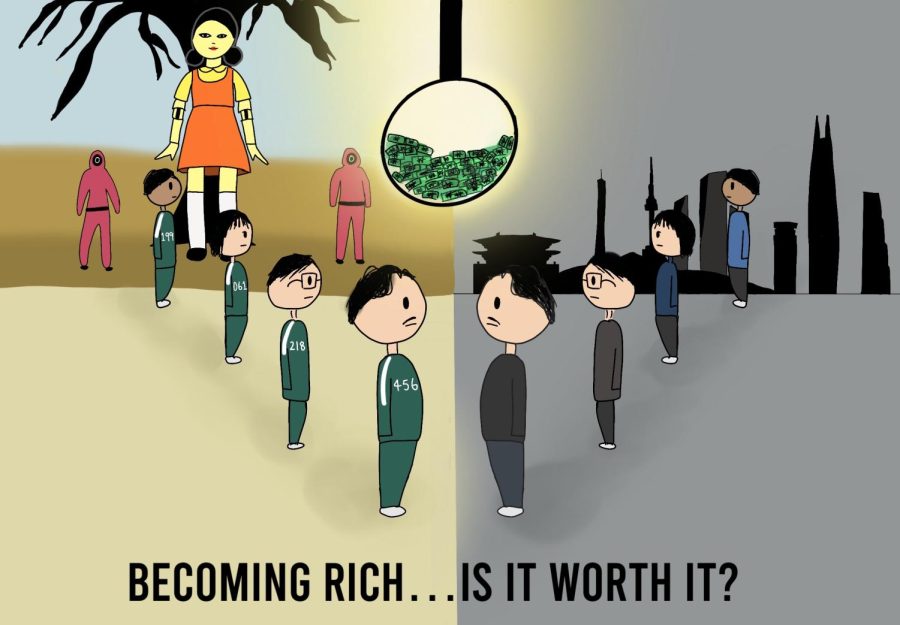The Disturbing Yet Beautiful Message of ‘Squid Game’
Netflix’s most watched series in history captivates audiences worldwide
Despite all the gore, death and violence, “Squid Game” is a wonderfully thrilling masterpiece worth watching for its powerful message.
October 29, 2021
Spoiler warning for “Squid Game.”
By now, word has gotten around about the hit Netflix series “Squid Game” that captivated viewers worldwide. At first, I was hesitant to watch this show because I had no interest in games, and the thumbnail of a colorful room with stairs covered in blood veered me away. However, after seeing “Squid Game” rank number one week after week, I thought I should try. Soon enough it became one of my favorite shows.
The first episode introduces our protagonist, Gi-hun (Lee Jung-jae), a broke middle-aged man who owes a great amount of debt. He meets a stranger at the subway station and is offered an opportunity to play a game and win 45.6 billion Korean won (about 38 million dollars).
Soon, Gi-hun joins 455 strangers in unknowingly signing a contract to compete against each other in risking their lives for money. Immediately, the competitors are thrown into their first game — Red Light, Green Light (as hinted in the title of the first episode), which is a simple children’s game. However, it becomes apparent that the game is not as simple as it sounds — if a competitor fails, they are eliminated and killed on the spot.
“Squid Game” does not shy away from brutal violence, death and gore. At the same time, it depicts visually pleasing landscapes and beautiful cinematography.
The second episode dives deeper into each character’s background and their life’s journey. The episode helps the viewers understand the characters’ choices and why they decided to play the game. The story that each character tells throughout the series eventually creates an emotional bond between the character and the viewer, which makes the viewers sympathize, and, in the later episodes, brings the audience to tears. The actors delivered astounding performances and brought their characters to life by portraying real-life situations of struggling communities.
The show adheres to the injustices and concerns happening in South Korea today by bringing in important characters like Sae-byeok (HoYeon Jung), a North Korean defector; and Ali (Anupam Tripathi), a migrant worker from Pakistan. In a global perspective, both characters take on the role of bringing out stories of the many marginalized communities in many countries.
As the series progresses, the games become more and more intense, and each competitor’s drive for winning the prize money becomes greater.
Sae-byeok represents an innocent citizen who is repressed in her own country and only wishes to escape to a better life. Ali represents the community of migrant workers who wish to earn more money for their families.
In an interview with Netflix Korea, model-actress HoYeon Jung explained that “‘Squid Game’ is a story about people” and that “each character’s thoughts and human nature are the things that you should focus on.”
As the series progresses, the games become more and more intense, and each competitor’s drive for winning the prize money becomes greater. Ultimately, the games test how far a person would go to obtain a large amount of money.
The effects of capitalism is also a significant focal point of the show as depicted in the intensity of the games and the person’s willingness to play. Throughout each episode, the number of competitors slowly decreases until the last game when it’s down to two people. The winner of the prize money leaves the game carrying the weight and guilt of all the lives lost.
People think that once they obtain a great amount of wealth their lives will change drastically in a good way. Sometimes people are willing to do whatever it takes to get rich, especially if there’s a shortcut (such as winning the lottery or gambling). However, we learn in the final episode that this common assumption is not true.
Despite all the gore, death and violence, “Squid Game” is a wonderfully thrilling masterpiece that is worth watching (I recommend, in the original language with subtitles) this season. As Bong Joon-ho, a South Korean Academy Award-winning director, once said, “Once you overcome the one-inch tall barrier of subtitles, you will be introduced to so many more amazing films.”
The Observer is Fordham Lincoln Center’s award-winning, 100% student-run newspaper. Donate to The Observer’s GiveCampus campaign to support student journalism today!














